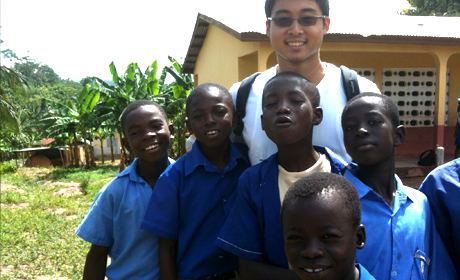The pilot year of Projects for Underserved Communities ends on a high note as engineering students return after completing overseas projects.
 In July, the first sequence of the Cockrell School of Engineering's Projects for Underserved Communities (PUC) culminated in the completion of new potable water distribution systems in Patriensa, Ghana, and water conservation systems in Santa Cruz, Peru. Villagers are immensely grateful for the good work of the engineering students, who shared their gifts of time and technical talents to benefit the communities.
In July, the first sequence of the Cockrell School of Engineering's Projects for Underserved Communities (PUC) culminated in the completion of new potable water distribution systems in Patriensa, Ghana, and water conservation systems in Santa Cruz, Peru. Villagers are immensely grateful for the good work of the engineering students, who shared their gifts of time and technical talents to benefit the communities.Students on the Ghana team installed a new water tank and pump system at a school where children can now drink clean water and wash their hands just a few steps from their classroom doors. To promote smart water use at a school in Peru, students installed water-conserving toilets and faucets and a drip irrigation system in one of the large gardens.
"The water project has changed the lives of teachers and children in the school," says Reverend J.A. Ofosuhene, pastor of Ebenezer Presbyterian Church in Ghana. "The members of the UT team were kind, considerate people. We are so much grateful for the wonderful service they rendered to our community."
During the fall and spring semesters, both PUC teams planned and designed projects in class and led reconnaissance trips to Santa Cruz and Patriensa to build relationships with community leaders and prepare for field execution of the projects. This summer, teams traveled abroad to oversee the implementation of the projects.
PUC is the first course of its kind at the Cockrell School that gives students opportunities to conduct engineering/construction projects in real-world classroom settings. The course was created by Janet Ellzey, vice provost for international programs and professor in the Department of Mechanical Engineering, and James O'Connor, C.T. Wells Professor in the Department of Civil, Architectural and Environmental Engineering.
"In many industrial settings, an engineer is responsible for only one aspect of a project, but PUC enables students to see the larger picture," says Ellzey. "Students benefit enormously from getting to know a community in another part of the world and understanding their needs and values. The teams are student led, so they develop organizational, leadership and fundraising skills as well as technical and communication skills."
"Students enjoy the Projects for Underserved Communities course because it's a team effort at its core," says O'Connor. "It's certainly more like being at work than being in school. It's like the real world in the sense that at the end of the day, what matters most is what you've contributed to the project."
Students Share in their Own Words
Rosaura Estrada – Peru Team
"The course showed me the immense need around the world for better infrastructure, for improving the supply and quality of water, and for working with governments and organizations in harmony to serve our communities. This experience has motivated me to continue working toward my degree in civil engineering so that I can make a contribution to fix those needs."
Cynthia Castro – Peru Team
"The PUC course prepared me for real life situations where projects succeed and fail. I had very high expectations at the beginning of the class and never thought of failure as a possibility for our project. PUC offers an experience that no other course in the university can provide. Engineering is not only about being able to do calculations for design, but also about interacting with clients at a professional level and adapting to new places and situations."
Makenzie Kuntz – Peru Team
"This experience has totally surpassed my expectations. The training we received prior to our travel to Peru, the amazing faculty that guided us, and the skills we acquired were all extremely beneficial and invaluable on their own. The travel and application of these skills made this a once-in-a-lifetime experience. I have become a better person and more conscious about the environment."
Stephen Marquardt – Ghana Team
"After going through PUC, I'm more prepared to work on proposals and professional presentations. I learned more about the real world from this program than I have throughout my engineering education. It was interesting to watch the villagers take time to laugh and enjoy being alive. It made me realize that you don't need money to make you happy — just love for life and those around you."
Edward Wang – Ghana Team
"As members of the PUC pilot class, we didn't know what to expect. The project's success was due to everyone's contributions and hard work. The villagers and community leaders helped set up the water system and set up contacts, housing, food and guidance, and none of this would have been possible without their contributions. To watch the project come to life is something I'll never forget."
Caleb Holobaugh – Ghana Team
"The Patriensa villagers were from a culture you only read about in National Geographic. The people have very little compared to what we have in America, yet they find happiness in little things … and each other. As a student in PUC, I developed skills and learned things that cannot be taught in a classroom setting. I had the chance to help others with my knowledge — it has been the most gratifying experience in my life."
Special thanks to the generosity of our corporate sponsors, Pluspetrol and Afren, members of the CAEE Academy and individual donors.







